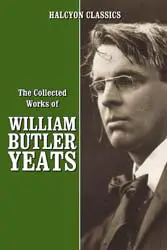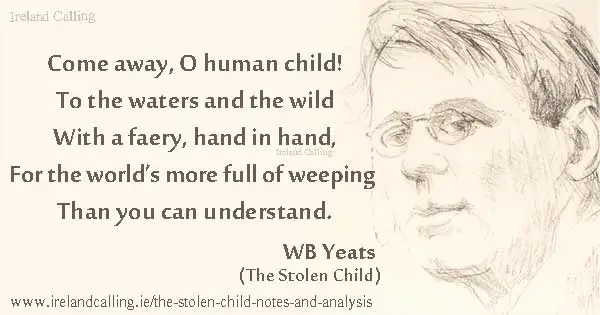The Stolen Child is one W B Yeats’ most popular early poems. Like much of his early work, it is based on the myths and legends he heard from local people while growing up in County Sligo.
The Stolen Child
Ireland’s 100 favourite poems
W B Yeats
There were many stories about fairies snatching children away and although no one took such tales too seriously, they could still create fear and unease in the subconscious of rural people well into the 20th century.
Yeats loved such stories and they provided a rich vein of material for his early writing. The Stolen Child was first published in Irish Monthly in 1896. It also appeared in Yeats’ first collection of Poems, Crossways, which was published in 1889.
The world’s more full of weeping …
The poem is called The Stolen Child but the fairies beguile the boy into coming with them rather than actually steal him.
They begin by offering food with “vats full of berries and of reddest stolen cherries”. This may seem commonplace today but rich fruits would have been a luxury in 19th century Ireland. The fact that the cherries are stolen also conjures up the idea of “forbidden fruit” which adds to the sense of temptation.
The fairies also beguile him with stories of dancing and merriment, and of mischief such as playing tricks on slumbering trout.
They also play on the young boy’s fear, telling him that “the world’s fuller of weeping than you can understand”.
This point is repeated in a four-line chorus at the end of each verse. It has a chanted, hypnotic rhythm which adds to the sense that the boy is being beguiled.
Having enticed the boy away in the final verse, the fairies contrast the familiar domestic sights he’s leaving such as the kettle boiling on the hob, with the “waters and the wild” that will be his new home.
Although the boy goes voluntarily, he is still stolen in the sense that he has been bewitched by the fairies’ chanting. The boy is unhurt but the reader is still left with a sense of unease, loss and foreboding.
The Stolen child references actual places in Ireland
The Stolen Child is set in Yeats’ native Co Sligo and in nearby Leitrim. Sleuth Wood is in Sligo where it is also known as Slish Wood. It comes from the Irish word, sliu, which means a slope or incline. Sleuth Wood therefore literary means ‘sloping wood’.
Rosses is on the coast of Sligo. It was a popular seaside destination for the Yeats family. Local folklore suggested it was also a popular haunt for fairies.
Glencar Waterfall is in Co Leitrim, just across the border from Sligo.

The Stolen Child
Where dips the rocky highland
Of Sleuth Wood in the lake,
There lies a leafy island
Where flapping herons wake
The drowsy water rats;
There we’ve hid our faery vats,
Full of berries
And of reddest stolen cherries.
Come away, O human child!
To the waters and the wild
With a faery, hand in hand,
For the world’s more full of weeping than you can understand.
Where the wave of moonlight glosses
The dim grey sands with light,
Far off by furthest Rosses
We foot it all the night,
Weaving olden dances
Mingling hands and mingling glances
Till the moon has taken flight;
To and fro we leap
And chase the frothy bubbles,
While the world is full of troubles
And anxious in its sleep.
Come away, O human child!
To the waters and the wild
With a faery, hand in hand,
For the world’s more full of weeping than you can understand.
Where the wandering water gushes
From the hills above Glen-Car,
In pools among the rushes
That scarce could bathe a star,
We seek for slumbering trout
And whispering in their ears
Give them unquiet dreams;
Leaning softly out
From ferns that drop their tears
Over the young streams.
Come away, O human child!
To the waters and the wild
With a faery, hand in hand,
For the world’s more full of weeping than you can understand.
Away with us he’s going,
The solemn-eyed:
He’ll hear no more the lowing
Of the calves on the warm hillside
Or the kettle on the hob
Sing peace into his breast,
Or see the brown mice bob
Round and round the oatmeal chest.
For he comes, the human child,
To the waters and the wild
With a faery, hand in hand,
For the world’s more full of weeping than he can understand.


The Stolen Child
The Stolen Child notes and analysis
W B Yeats
